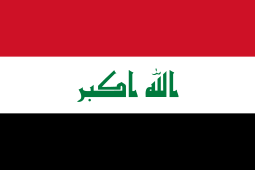List of United Nations Security Council resolutions concerning Iraq
  | ||||||||||||||||||||||||||||||
|
||||||||||||||||||||||||||||||
The United Nations Security Council (UNSC) is the organ of the United Nations charged with maintaining peace and security among nations. While other organs of the United Nations only make recommendations to member governments, the Security Council has the power to make decisions which member governments are obliged to carry out under the United Nations Charter. The decisions of the Council are known as United Nations Security Council Resolutions.
There have been three major events in Iraq's history for which the UN has passed numerous resolutions: the Iran–Iraq War, the Persian Gulf War, and the Iraq disarmament crisis leading up to and following the 2003 invasion of Iraq.
Iraq related resolutions
| Resolution | Date | Vote | Concerns |
|---|---|---|---|
| 479 | 28 September 1980 | Unanimous | Noted the beginning of the Iran–Iraq War. |
| 514 | 12 July 1982 | Unanimous | Called for an end to the Iran–Iraq War. |
| 522 | 4 October 1982 | Unanimous | Called for an end to the Iran–Iraq War. |
| 540 | 31 October 1983 | 12-0-3 | Condemned violations of international law in the Iran–Iraq War. |
| 582 | 24 February 1986 | Unanimous | "Deplores" the use of chemical weapons in the Iran–Iraq War. |
| 588 | 8 October 1986 | Unanimous | Called for the implementation of resolution 582. |
| 598 | 20 July 1987 | Unanimous | Demanded an immediate cease-fire between Iran and Iraq; requested that the UN Secretary-General start an investigation to determine how the conflict started. |
| 612 | 9 May 1988 | Condemned the use of chemical weapons in the Iran–Iraq War, but did not single out Iraq as the only side to use them. Instead, the resolution said that the Security Council, "Expects both sides to refrain from the future use of chemical weapons." | |
| 619 | 9 August 1988 | Created UNIIMOG to observe the implementation of a cease-fire for the Iran–Iraq War. Extended by resolutions 631, 642, 651, 671, 676 and 685. Terminated 28 February 1991. | |
| 620 | 26 August 1988 | Condemned the use of chemical weapons in the Iran–Iraq War. | |
| 660 | 2 August 1990 | 14-0-1, Yemen abstaining | Condemned the Iraqi invasion of Kuwait and demanded a withdrawal of Iraqi troops. Supported by resolutions 662, 664, 665, 666, 667, 669, 670, 674, and 677. |
| 661 | 6 August 1990 | 13-0-2; Cuba, Yemen | Placed economic sanctions on Iraq in response to the invasion of Kuwait. |
| 678 | 29 November 1990 | 12-2-1 | Authorized use of force against Iraq to "uphold and implement resolution 660 and all subsequent resolutions and to restore international peace and security in the area". |
| 686 | 2 March 1991 | 11-1-3 | Demanded Iraq's acceptance of all previous resolutions concerning the war with Kuwait. |
| 687 | 3 April 1991 | 12-1-2 | Formal ceasefire ending the Persian Gulf War, with the conditions that Iraq:
|
| 688 | 5 April 1991 | Condemned the repression of Iraqi Kurds. | |
| 707 | 15 August 1991 | Demands immediate, complete, full compliance with UNSCR 687. | |
| 715 | 11 October 1991 | Approves United Nations Special Commission on Iraq and International Atomic Energy Agency inspection provisions. | |
| 833 | 27 May 1993 | Acknowledges clarifications of Iraq-Kuwait border and United Nations Iraq-Kuwait Observation Mission (UNIKOM). | |
| 899 | 4 March 1994 | Compensation payments to Iraqi private citizens whose assets remained on Kuwaiti territory following the demarcation of the Iraq-Kuwait border. | |
| 949 | 15 October 1994 | Condemned the Iraqi military buildup on Kuwaiti border. | |
| 986 | 14 April 1995 | Created the Oil-for-Food Programme. Supported by resolution 1111. | |
| 1051 | 27 March 1996 | Unanimous | Created a mechanism to monitor Iraqi "dual use" import and exports. |
| 1060 | 12 June 1996 | Unanimous | Demands Iraq allow access to sites, weapons, transport and equipment by United Nations Special Commission weapons inspectors. |
| 1284 | 17 December 1999 | 11-0-4 | Changed the Iraqi inspection program from UNSCOM to UNMOVIC. |
| 1441 | 8 November 2002 | Unanimous | Gave Iraq "a final opportunity to comply with its disarmament obligations". After Hans Blix of UNMOVIC reported to the UN on 7 March 2003, the US, UK, and other members of the "coalition of the willing" declared that Iraq remained in material breach of resolution 687. Efforts aimed at a new Council resolution authorizing the invasion were aborted owing to resistance from other members of the Council including veto-wielding members. Iraq was invaded anyway, on 20 March. |
| 1483 | 22 May 2003 | 14-0-0, Syria not present | Recognized the US and the UK as occupying powers under international law, with legitimate authority in Iraq. Removed economic sanctions imposed during the Gulf War. |
| 1500 | 14 August 2003 | 14-0-1, Syria abstaining | Created the United Nations Assistance Mission for Iraq as a special representative of the UN Secretary General. Extended by resolutions 1557, 1619, and 1700. |
| 1546 | 8 June 2004 | Unanimous | Endorsed the dissolution of the Coalition Provisional Authority in favor of the Iraqi Interim Government as a step toward democracy. |
| 1723 | 18 November 2006 | Unanimous | Extended the mandate for Multinational Force Iraq until 31 December 2007. |
| 1790 | 18 December 2007 | Extended the mandate for Multinational Force Iraq until 31 December 2008. |
This article is issued from
Wikipedia.
The text is licensed under Creative Commons - Attribution - Sharealike.
Additional terms may apply for the media files.